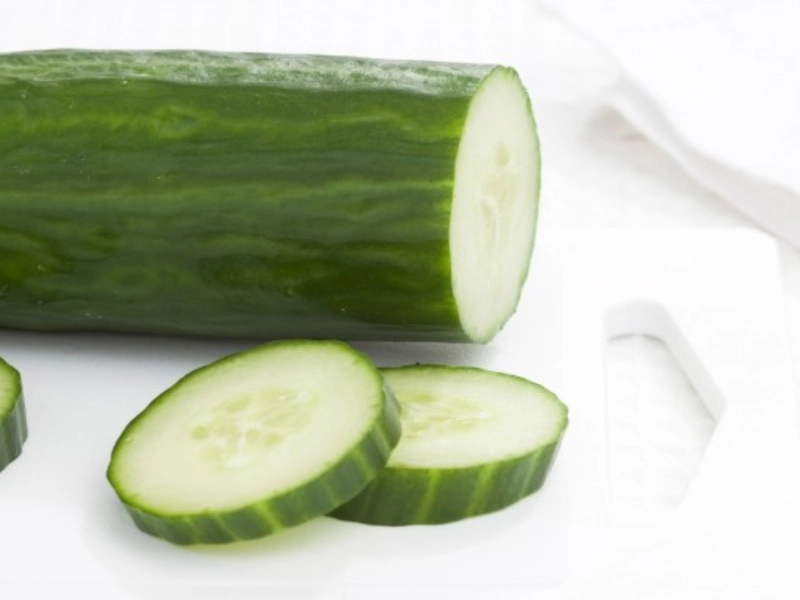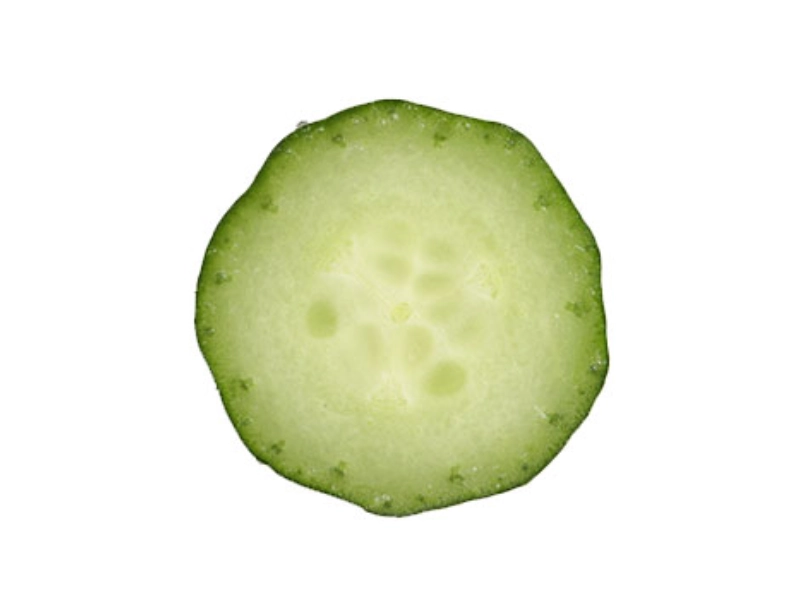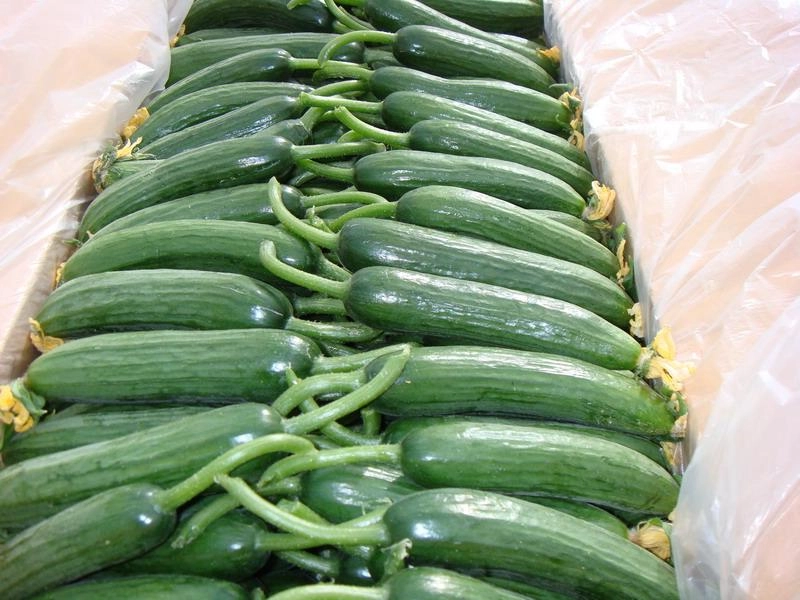Cucumbers are delicious dipped into a smooth hummus or tossed in a salad. But in addition to being tasty, they also offer other health benefits: In addition to being low in calories, cucumbers are a good source of potassium, vitamin K, vitamin C and vitamin A. Although cucumbers are considered a vegetable in the culinary world, botanists actually classify them as a fruit.

 From a culinary and cultural perspective, cucumbers are considered vegetables because they are used in savory dishes such as salads and pickles. However, in biology, they are classified as fruits. Cucumbers belong to the same family (Cucurbitaceae) as melons, true berries, and pumpkins.
Cucumbers contain cucurbitacins and other bioactive substances that help lower stomach acidity that can cause heartburn. Additionally, they aid the digestive system by reducing bloating and constipation. Moreover, they are amazing for treating dry, swollen and puffy eyelids. Sliced
cucumbers have only 8 calories per half cup, so they can be incorporated into a balanced diet without adding excess fat, sugar, and sodium. They are also rich in potassium and vitamin K. This is why they are popular as a natural heartburn remedy. They also help reduce and prevent headaches. They are also a good source of protein and fiber. Additionally, they are a great source of vitamin C, which strengthens the immune system.
From a culinary and cultural perspective, cucumbers are considered vegetables because they are used in savory dishes such as salads and pickles. However, in biology, they are classified as fruits. Cucumbers belong to the same family (Cucurbitaceae) as melons, true berries, and pumpkins.
Cucumbers contain cucurbitacins and other bioactive substances that help lower stomach acidity that can cause heartburn. Additionally, they aid the digestive system by reducing bloating and constipation. Moreover, they are amazing for treating dry, swollen and puffy eyelids. Sliced
cucumbers have only 8 calories per half cup, so they can be incorporated into a balanced diet without adding excess fat, sugar, and sodium. They are also rich in potassium and vitamin K. This is why they are popular as a natural heartburn remedy. They also help reduce and prevent headaches. They are also a good source of protein and fiber. Additionally, they are a great source of vitamin C, which strengthens the immune system.
 Cucumbers are rich in fiber, which helps keep your digestive tract healthy and relieve constipation. They are also a strong source of vitamin C, which may reduce stress. Cucumbers are rich in beta-carotene and antioxidants, which are essential for a strong immune system. They also contain potassium, which lowers your heart rate and blood pressure.
Cucumber slices have minimal calories, with only about 2 grams of carbohydrates and 2 milligrams of sugar per cup. They are low in fat, making them a great snack for those trying to maintain a healthy weight or lose weight.
One natural remedy for heartburn is cucumber. This vegetable contains enzymes that disrupt gut bacteria and balance stomach acid, which may reduce indigestion. In addition, it may help relieve constipation and nausea. The fruit is also high in silica, which helps strengthen hair and nails. Cucumbers also contain vitamin K, which is necessary for blood clotting.
Cucumbers are rich in fiber, which helps keep your digestive tract healthy and relieve constipation. They are also a strong source of vitamin C, which may reduce stress. Cucumbers are rich in beta-carotene and antioxidants, which are essential for a strong immune system. They also contain potassium, which lowers your heart rate and blood pressure.
Cucumber slices have minimal calories, with only about 2 grams of carbohydrates and 2 milligrams of sugar per cup. They are low in fat, making them a great snack for those trying to maintain a healthy weight or lose weight.
One natural remedy for heartburn is cucumber. This vegetable contains enzymes that disrupt gut bacteria and balance stomach acid, which may reduce indigestion. In addition, it may help relieve constipation and nausea. The fruit is also high in silica, which helps strengthen hair and nails. Cucumbers also contain vitamin K, which is necessary for blood clotting.
 For a very long time, cucumbers have been used as a hydrating ingredient in smoothies and iced drinks, as an ingredient in comforting salads, and as the basis for delicate Victorian sandwiches served at tea parties. However, few people are aware of its much more superior nutritional profile. Cucumbers, which belong to the Cucurbitaceae family, are rich in several essential elements and certain plant compounds with antioxidant properties. For example,
one cup of cucumbers with skin contains more than 20% of the recommended daily amount of vitamin K. Studies show that this nutrient helps prevent osteoporosis and is necessary for the formation of new bone. In addition,
cucumbers are rich in flavonoids such as fisetin and antioxidants such as kaempferol and quercetin. Antioxidants are essential to maintain the health of the body, as they neutralize free radicals and reduce their harmful effects. Many diseases, such as cancer and heart disease, are linked to free radicals. Cucumbers are low in sodium and rich in potassium, making them a great choice for lowering blood pressure.
For a very long time, cucumbers have been used as a hydrating ingredient in smoothies and iced drinks, as an ingredient in comforting salads, and as the basis for delicate Victorian sandwiches served at tea parties. However, few people are aware of its much more superior nutritional profile. Cucumbers, which belong to the Cucurbitaceae family, are rich in several essential elements and certain plant compounds with antioxidant properties. For example,
one cup of cucumbers with skin contains more than 20% of the recommended daily amount of vitamin K. Studies show that this nutrient helps prevent osteoporosis and is necessary for the formation of new bone. In addition,
cucumbers are rich in flavonoids such as fisetin and antioxidants such as kaempferol and quercetin. Antioxidants are essential to maintain the health of the body, as they neutralize free radicals and reduce their harmful effects. Many diseases, such as cancer and heart disease, are linked to free radicals. Cucumbers are low in sodium and rich in potassium, making them a great choice for lowering blood pressure.